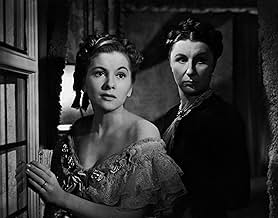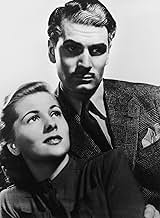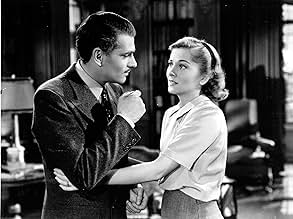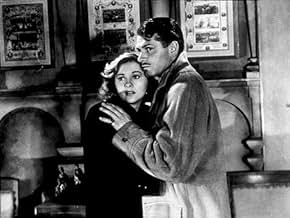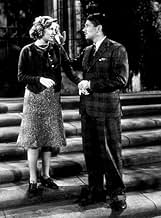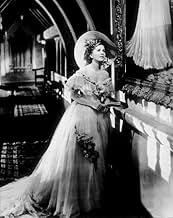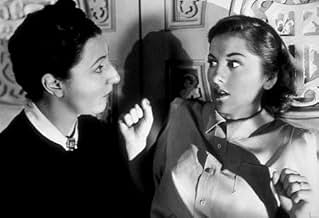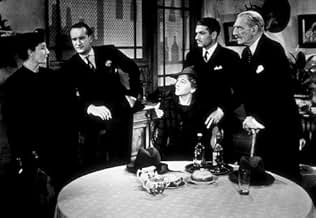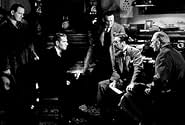Una mujer acomplejada hace esfuerzos para adaptarse a su nuevo papel como esposa de un aristócrata y evitar ser intimidada por la presencia fantasmal de su primera esposa.Una mujer acomplejada hace esfuerzos para adaptarse a su nuevo papel como esposa de un aristócrata y evitar ser intimidada por la presencia fantasmal de su primera esposa.Una mujer acomplejada hace esfuerzos para adaptarse a su nuevo papel como esposa de un aristócrata y evitar ser intimidada por la presencia fantasmal de su primera esposa.
- Dirección
- Guión
- Reparto principal
- Ganó 2 premios Óscar
- 10 premios y 10 nominaciones en total
- Maid
- (sin acreditar)
- Policeman
- (sin acreditar)
Resumen
Reseñas destacadas
Most of the time the story itself moves fairly slowly, allowing the focus to be on the characters, but there are also a couple of very good plot twists, which can be very surprising if you've not seen the movie or read the novel. So if you happen not to know the story, it's a good idea to see the film before reading a lot of comments about it. Laurence Olivier, Joan Fontaine, Judith Anderson, and George Sanders are all perfectly cast and do a wonderful job bringing their characters to life, and making you feel a part of the story.
"Rebecca" should be satisfying not only to any Hitchcock fan, but to anyone who likes classic movies. Whether you like romance, suspense, or drama, they're all here, and put together by a director and cast that are masters of their art.
Apart from being a tad bit long, this is a well made film. I love the inside of Mandalay and Sir Laurence Olivier played a wonderful mysterious and sullen Maximillian De Winter opposite his new wife, a beautiful and naive young Joan Fontaine who is never even given a name here, probably deliberately and in keeping with how mousy and "second hand" she feels about herself in relation to the first and late Mrs. De Winter, who is actually Rebecca from the title.
Of course there is also George Sanders, playing the type of character he is best known for--sarcastic, snobby, self-assured, pompous, witty and verbose. He hits the nail on the head as Rebecca's "cousin" - so he calls himself. Of course the most eerie and unsettling character was Mrs. Danvers, Rebecca's housekeeper or "maid in waiting." Danvers takes great pains in sabotaging the second Mrs. De Winter's marital relationship with Max de Winter,--even going as far as calmly urging her to to plunge to her death into the water from Rebecca's bedroom window at Mandalay. There are a couple of twists in this movie, but I won't give them away. It's best if you watch them unfold yourself in true Hitchcockian style.
I will say that Rebecca, the first wife of Max de Winter, is NEVER seen, but we learn about her by what is said about her by the various characters, even going as far as seeing the untouched shrine of a bedroom maintained by Mrs. Danvers. But soon you learn that Rebecca was never the perfect wife Danvers and others make her out to be. The ending is a surprise in more way than one, and yet Mrs. Danvers gets the last word in her own way. A great movie by Alfred Hitchcock and David O. Selznick.
The gorgeous Fontaine plays a meek young woman (we never discover her name, but she's not the 'Rebecca' of the title) who falls for rich aristocrat 'Maxim' de Winter (Laurence Olivier) while working in the South of France. Equally besotted, Maxim proposes to the self-effacing beauty, and takes her back to his ancestral home, Manderley, which he once shared with his first wife Rebecca, before she drowned in a boating accident. The new Mrs. de Winter does her best to adapt to her new lifestyle, but is constantly under the shadow of her predecessor, with stern housekeeper Mrs. Danvers (Judith Anderson) being particularly disapproving of Maxim's new bride, deliberately driving a wedge between the married couple and even going so far as to try and talk Mrs. de Winter Mk. II into killing herself.
Thus far, the film is pure melodrama and sappy romance, and avid Hitchcock fans might be wondering where the murder and mystery is; worry, not, for this comes in the second half of the film and provides plenty of intrigue and suspense as Maxim reveals what really happened to his first wife and is subsequently suspected of her murder. Both his wife and the viewer are aware of his innocence, but with Rebecca's lover Jack Favell (George Sanders) accusing Mr. de Winter of murder, and plenty of damning evidence, things are looking pretty bad for the poor fellow. It all wraps up nicely in the end, of course, but there are plenty of tense moments along the way, all handled in the director's typically assured manner, with bags of atmosphere and sumptuous cinematography.
But as great as the direction and story are, it is the performances that really make Rebecca a winner: Olivier is perfect as the troubled toff, Anderson is wonderfully wicked as scheming housekeeper Danvers, nobody does 'bumbling oaf' quite as well as Nigel Bruce (playing Major Giles Lacy, who puts his foot in his mouth whenever he speaks), Sanders is suitably slimy as adulterous blackmailer Favell, and Fontaine... well, she is completely captivating, every smile, every tilt of her head, and every nervous glance guaranteed to win over the viewer (she was nominated for Best Actress in a Leading Role at the Oscars, but lost to Ginger Rogers). Hell, even the dog that played Maxim's mutt Jasper was excellent (so cute!).
The movie, on the whole, is similarly amazing, capturing the spirit and the tone of those great Gothic romances. Watching Rebecca, I was reminded (pleasantly) of Wuthering Heights; I do not mean to suggest that in some way this film re-tells the tale of Cathy and Heathcliff, but rather that Rebecca has the feel of Bronte's novel (I am most certainly not talking about the William Wyler adaptation a few years before the release of Rebecca. That's a terrible film that somehow manages to mis-interpret the novel).
I must assume that the guiding hand of Hitchcock played no small role in recreating the feel of a Gothic romance. There are very few that would be able to take a love story, infuse it with such gloom, with such a sense of foreboding, and still manage to create something that ends happily without it feeling like a cop-out. I'd also like to draw everyone's attention to the incredibly moving section of the film that occurs between the arrival of the second Mrs. DeWinter at Mandalay and the masqued ball. The emotional strain on the Joan Fontaine character is so palpable, so absolutely taxing, that it actually pains me to watch. I hurt along with her. Few other movies affect me so emotionally - one of them is Vertigo.
All in all, this is a fantastic piece of film-making from Hollywood's golden age. Laurence Olivier is in top-form, as he plays the quiet, sad Maxim and George Sanders is positively hateful.
10/10 - a visceral masterpiece
Oscars Best Picture Winners, Ranked
Oscars Best Picture Winners, Ranked
¿Sabías que...?
- CuriosidadesOver 20 actresses were screen-tested for the role of Mrs. de Winter, which eventually went to newcomer Joan Fontaine. One of them was Vivien Leigh, for whom Sir Laurence Olivier was pressing, as they were a couple at the time.
- PifiasIn the outside take of Manderley seen in the scene where the Narrator stares at one window being closed, it's a miniature, as is the 'Mrs Danvers' dummy dressed in black. You can realize this by the motion of the window as it's being closed, not in a continuous way, but by little fast jumps, which look too unreal.
- Citas
[the new Mrs. de Winter wants to dispose of Rebecca's letters]
The Second Mrs. de Winter: I want you to get rid of all these things.
Mrs. Danvers: But these are Mrs. de Winter's things.
The Second Mrs. de Winter: *I* am Mrs. de Winter now!
- Créditos adicionalesThe original 1940 credits read "Selznick International presents its picturization of Daphne Du Maurier's 'Rebecca'". The credits on the re-issue version read "The Selznick Studio presents its production of Daphne Du Maurier's 'Rebecca'".
- Versiones alternativasThe opening credits were re-done (with different font) for the 1950's re-release of the movie. It is these credits that have turned up on all telecasts of the film (even as recently as 2013) and all previous video releases. The Criterion release (which is now only available through outlet stores) restores all of the credits to their original form.
- ConexionesEdited into El último magnate: Pilot (2016)
- Banda sonoraLove's Old Sweet Song (Just a Song at Twilight)
(1884) (uncredited)
Music by J.L. Molloy
Hummed by Joan Fontaine
Selecciones populares
Detalles
- Fecha de lanzamiento
- País de origen
- Idiomas
- Títulos en diferentes países
- Rebeca, una mujer inolvidable
- Localizaciones del rodaje
- Empresa productora
- Ver más compañías en los créditos en IMDbPro
Taquilla
- Presupuesto
- 1.288.000 US$ (estimación)
- Recaudación en todo el mundo
- 113.328 US$
- Duración
- 2h 10min(130 min)
- Color
- Relación de aspecto
- 1.37 : 1



